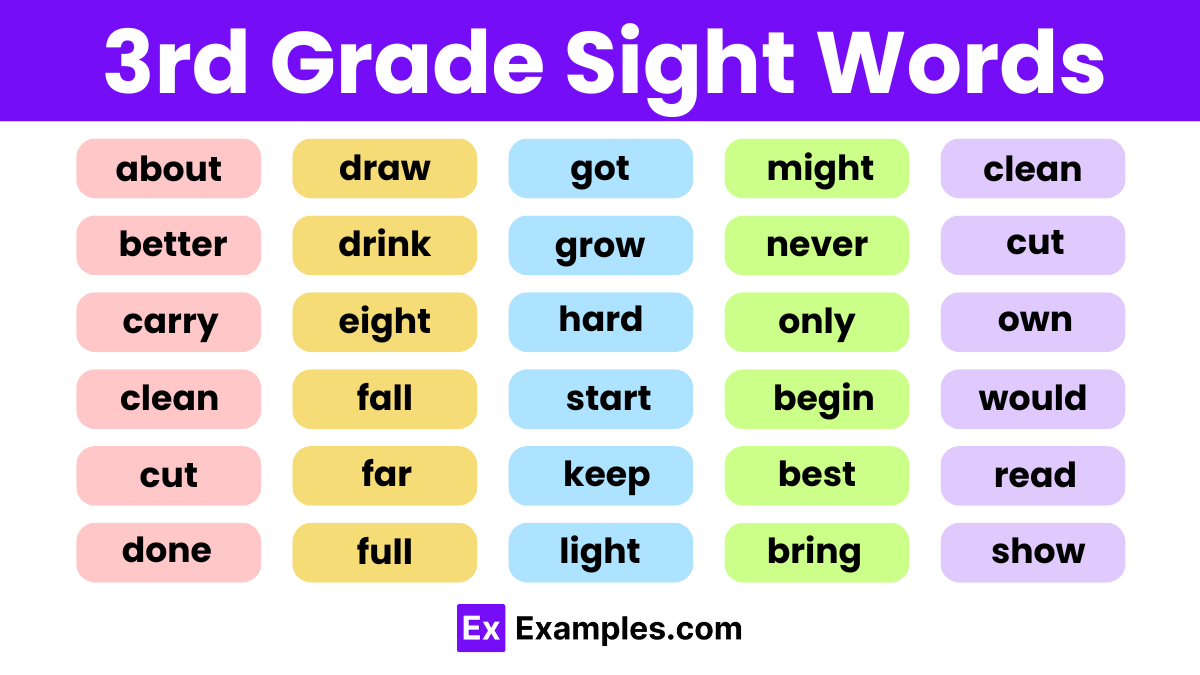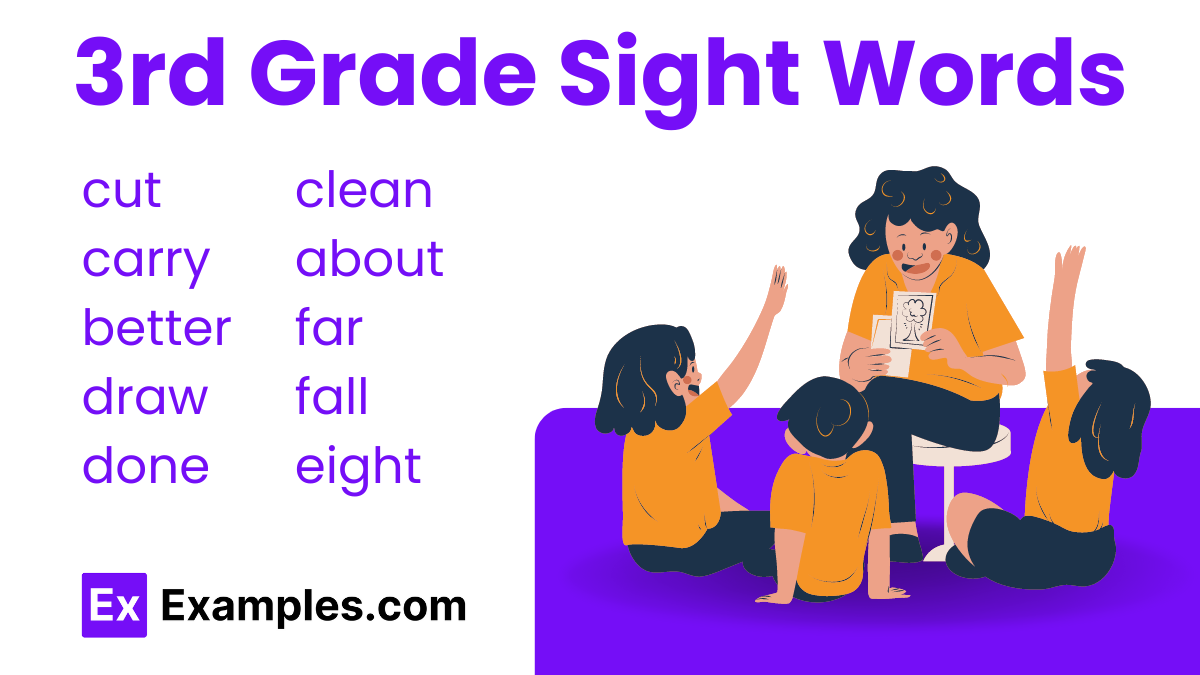100+ 3rd Grade Sight Words List, Meaning, PDF
Sight words lay the foundation for literacy from the earliest stages of education, beginning in preschool. By 3rd grade, students are building upon the foundational sight words they’ve come to know in 1st and 2nd grade, stepping into more sophisticated territory. This progression is vital for enhancing their reading fluency and empowering their writing capabilities. At this stage, the complexity of sight words increases, matching the students’ growing comprehension and literacy skills. Engaging in interactive and enjoyable learning experiences is key to embedding these crucial words deeply in young minds. Through creative methods, children learn to seamlessly integrate sight words into coherent sentences, significantly advancing their reading and writing proficiency. This exploration into 3rd grade sight words marks a significant leap in a child’s educational path, emphasizing their importance in fostering a deeper connection with language.
List of 3rd Grade Sight Words

| about | write | own |
| better | hard | pick |
| carry | start | read |
| clean | keep | show |
| cut | light | small |
| done | might | today |
| draw | never | together |
| drink | only | try |
| eight | begin | warm |
| fall | best | why |
| far | bring | wish |
| full | carry | work |
| got | clean | |
| grow | would |
List of Third Grade Sight Words with Meanings and Usage
| Sight Word | Meaning | Usage in a Sentence |
|---|---|---|
| about | on the subject of; concerning | I read a book about dinosaurs. |
| better | of superior quality or excellence | She feels better today after resting. |
| carry | to take or support from one place to another | Can you carry this box for me? |
| clean | free from dirt or pollution | Please clean your room before going out. |
| cut | to divide with a sharp instrument | He learned how to cut paper into shapes. |
| done | completed; finished | I am done with my homework. |
| draw | to produce a picture with pencils or other tools | She likes to draw pictures of animals. |
| drink | to take liquid into the mouth and swallow | Remember to drink water after playing. |
| eight | the number after seven | My brother is eight years old. |
| fall | to move downwards, typically rapidly and freely without control | Leaves fall from the trees in autumn. |
| far | at, to, or by a great distance | We traveled far to get here. |
| full | containing or holding as much or as many as possible | The glass is full of water. |
| got | past tense of get; to come to have or hold | She got a new book yesterday. |
| grow | to increase in size or amount | Plants grow when they get enough sunlight. |
| hard | with a great deal of effort | He works hard to achieve his goals. |
| keep | to continue to have or hold; to not lose | Please keep the door closed. |
| light | the natural agent that stimulates sight and makes things visible | The morning light fills the room. |
| might | used to express possibility | We might go to the beach tomorrow. |
| never | at no time in the past or future | I never forget to brush my teeth. |
| only | and no one or nothing more besides | She is the only person I told. |
Benefits of Learning 3rd Grade Sight Words
Enhanced Reading Fluency
- Quick Recognition: Knowing sight words allows children to recognize them without having to decode each letter, leading to smoother and faster reading.
- Increased Comprehension: With automatic recognition of common words, students can focus more on the meaning of texts, improving their overall understanding.
Boosted Writing Skills
- Ease of Expression: Familiarity with sight words aids in writing, as children can easily recall and use these words, making writing tasks less daunting.
- Improved Spelling: Many sight words are irregularly spelled and learning them helps children spell these tricky words correctly in their writing.
Expanded Vocabulary
- Broadened Language Use: Exposure to a variety of sight words enriches a child’s vocabulary, enabling more nuanced expression and comprehension.
- Contextual Understanding: Learning sight words in context helps students grasp nuanced meanings and uses, further expanding their linguistic capabilities.
Confidence in Learning
- Reading Confidence: Mastery of sight words boosts self-esteem, as children feel more competent in their reading abilities.
- Encouragement to Explore: With increased confidence, students are more likely to engage with challenging texts and explore new genres.
Foundation for Future Learning
- Preparation for Complex Texts: A solid grasp of sight words prepares students for the complexities of later grade-level readings, including literature, technical texts, and informational materials.
- Critical Thinking Skills: As reading fluency improves, students can better engage in critical thinking and analysis, key skills for advanced learning.
Enjoyment in Reading and Writing
- Love for Reading: Fluency and comprehension improvements make reading a more enjoyable and fulfilling activity.
- Creative Expression: With a strong sight word vocabulary, students can more freely express themselves creatively, whether in stories, reports, or personal reflections.
How to Teach 3rd Grade Sight Words to Kids
- Incorporate Visual Aids:
- Use flashcards and word walls as visual reminders of sight words.
- Color-coding words can help differentiate them and make learning more organized.
- Engage with Interactive Games:
- Sight word bingo, memory games, and word treasure hunts can make learning fun and engaging.
- Online games and apps designed for sight word practice offer interactive learning opportunities.
- Practice Through Reading:
- Encourage reading books that contain a high frequency of sight words.
- Highlight or underline sight words in texts to draw attention to them.
- Utilize Writing Activities:
- Have students practice writing sight words in sentences and stories.
- Sight word journals can be a fun way for kids to record new words they learn and use them in context.
- Implement Repetition and Review:
- Regularly review sight words using different methods to reinforce memory.
- Spaced repetition, where sight words are reviewed at increasing intervals, can be very effective.
- Create Sight Word Sentences:
- Ask students to create sentences or even short stories using a list of sight words, which helps in understanding usage and context.
- Employ Music and Movement:
- Sight word songs and chants can enhance memorization through rhythm and repetition.
- Incorporating actions or gestures with sight words can aid kinesthetic learners.
- Use Technology and Multimedia:
- Educational videos that focus on sight words can be a great visual and auditory learning tool.
- Apps and online resources can provide interactive and personalized sight word practice.
Tips for Teaching 3rd Grade Sight Words to Kids
- Start with a List: Begin with a curated list of 3rd grade sight words. Introduce them gradually to avoid overwhelming students.
- Use Flashcards: Flashcards are a classic, effective tool for memorization. Make it interactive by asking students to say the word, use it in a sentence, or draw it.
- Incorporate Games: Games like sight word bingo, memory match, or word fishing make learning fun and encourage active participation.
- Read Aloud Together: Choose books with a high frequency of sight words. Read together, pointing out and discussing sight words as you go.
- Encourage Writing: Have students practice writing sight words in sentences. Journaling or story creation with sight words can also enhance understanding.
- Utilize Technology: Educational apps and online games designed for sight word learning offer personalized and interactive experiences.
- Create a Word Wall: A classroom or home word wall where new sight words are added regularly can serve as a constant learning aid.
Fill in the Blanks with Sight Words
Instructions: Choose the correct sight word from the choices below to complete each sentence.
- They ________ to the music during the show.
- a) danced
- b) dance
- c) dancing
- d) dances
- My cat ________ in the sunny spot on the floor.
- a) lays
- b) lay
- c) lain
- d) lying
- We ________ excited for the field trip tomorrow.
- a) is
- b) am
- c) are
- d) be
- She ________ her homework after dinner every night.
- a) do
- b) does
- c) doing
- d) did
- The flowers ________ beautifully in the spring.
- a) bloom
- b) blooms
- c) bloomed
- d) blooming
- Our team ________ the game by a large margin.
- a) win
- b) wins
- c) won
- d) winning
- The library ________ new books every month.
- a) get
- b) gets
- c) got
- d) getting
- I ________ help with my math homework.
- a) need
- b) needs
- c) needed
- d) needing
- We ________ to the park even when it’s cold.
- a) go
- b) goes
- c) going
- d) gone
- He ________ his bike to school every day.
- a) ride
- b) rides
- c) rode
- d) riding
Answers:
- a) danced
- b) lay
- c) are
- b) does
- a) bloom
- c) won
- b) gets
- a) need
- a) go
- b) rides


